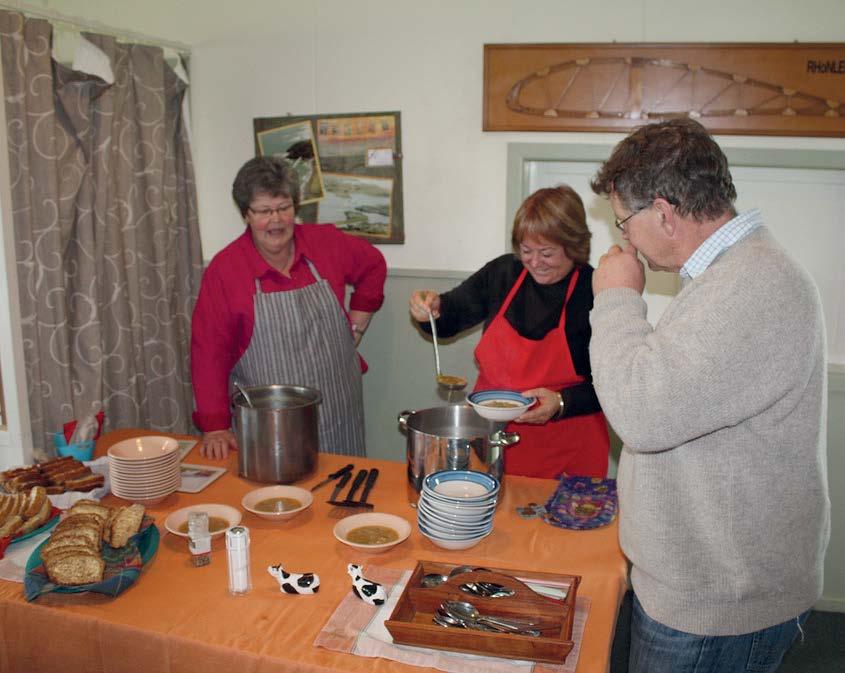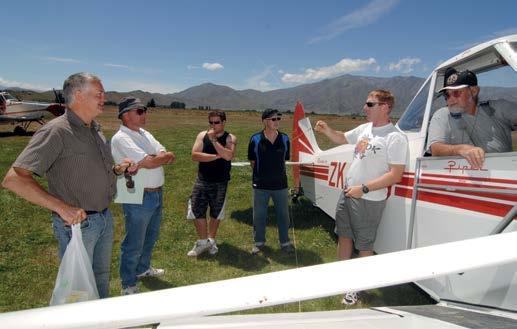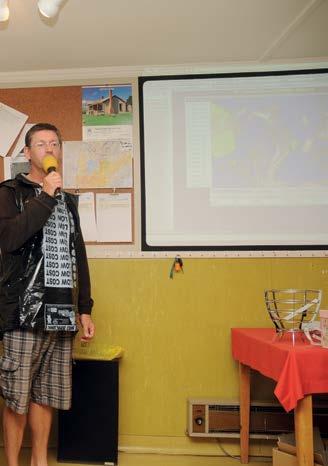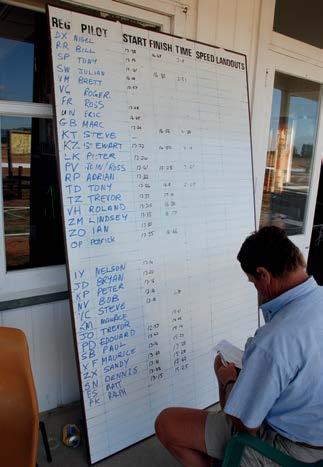
14 minute read
So you think Contests are all about Flying?
from SoaringNZ Issue 21
by mccawmedia
By Jan Mace

Advertisement

Jan is a well known non glider pilot, responsible for mothering and feeding large parts of the gliding fraternity at events at Matamata. She looks at the roles of volunteers in running a gliding contest, based on the recent Matamata Competition held in conjunction with the National Club Class contest. Some of her comments are specific for a Matamata contest but most are true for all contests in New Zealand. South Island pilots don’t know what they’re missing if they’ve never attended a Matamata contest since Jan’s been around. Her ‘café service’ during the day and dinners at night are a highlight of any event held there.
I’ve now found out that putting together a contest is more than settling on a date, marking the calendar and turning up. I suspect some others know this too.
The Starting Point
At a committee meeting, discussions can be very short on some subjects but long and drawn-out on others. So, it goes something like this -
Chairman: “Next - Nationals. Dates?” Participant No 1: “2nd week in February this time.” Chairman: “Calendar, 6-13th .”
Participant No 2: “What’s practice day? Saturday?” Other: “That’s usual. Finish on Saturday or Sunday?”
Bit of discussion on this one. Need to cater for people travelling versus need for contest days, especially if the weather turns bad versus The Rules versus length of time people can get off work and then a little about the old days and what happened. Then, “Sunday then?”
Participant No 3: “And you’ll organise all the positions, Mr Chairman.” (Not a question, just statement of fact and 20 phone calls and emails and numerous considerations wrapped up so neatly!)
Participant No 1: “What about prize money?”
Ohh oh. Big new subject this one. Points of view are varied:- not been done before, will more participants come? Will it affect safety issues? Have we got the money? Do we increase entry fee? Does it increase mana or take away from contest intent? How much, how many and who is eligible? In summary, it was decided that a new contest could have a cash prize and we would reassess for next time. Some funding from reserves and some from entry fees.
Next topic – the meeting continued. And so the contest came to pass.
First Day
Turning up on the first day is daunting. The weather’s looking alright, which is always a good start, and does have such a big effect on how the contest goes. Will all the volunteers be able to turn up? It would be great if a few more decide to come and compete. Hope everyone has a great, safe week. Then as the day goes on it’s like a family reunion, re-meeting previous competitors, greeting some new ones, catching up on news, and the familiar buzz of putting gliders together, getting GPS loggers and beds sorted.
The Contest Director (CD) starts directing – setting up the briefing room, copies of Rules, getting the low down on who’s doing what. A corner for his business is arranged, times and whiteboard markers put in place. Airspace contact, maps, phone numbers, coffee, and he’s settled and on board. Safety briefing is the only formal duty today - but so important – and with a formal hand-over from Chairman of the organising committee to the CD, the show is on the road.
But a little test for the system gets thrown in. An accident up the road disrupts the local power supply. Power for the Clubrooms expected about 7pm. Numbers wanting dinner - 16, leading to a great BBQ at the club and the biggest vege stir-fry ever seen! Problem sorting, information gathering, and initiative all get mentioned in reports.
Contest Days
A rhythm is set up amongst contestants and volunteers. Contestants may feel they are under a lot of pressure but from the outside looking on they have a pretty cruisey time. First thing in the morning they do their ‘glider loving’: washing, bit of polishing, tugging this or that wire or lever, installing the computer loggers. Then they wander in for a cup of coffee and fresh cake and settle in for briefing.
After briefing, which confirms what they knew the weather was doing, presents a task which is probably a little harder than what they wanted, plus lets them know their assigned place and time to be for the launch, they get their freshly made lunch. They have a little social time, fill water bottles, attend to ablutions, take the glider to the line and wait for their launch.
Then it’s flying, oh-how-I-love-to-fly time, three to five hours of their most favourite activity with some like minded people until they get back home. Dinner is all cooked, the beers are cold, and they can indulge in glider talk for the rest of the evening. A super day.
Admittedly, there may be a couple of hiccups. Landing out can be bit inconvenient, but on the up side, they get to meet some of the local folk. There’s usually a cup of tea at least, and interested persons they can explain the gliding experience to. Not quite as good as gliding itself, but close. Some kind people retrieve them, help put the glider together, and tea is cooked, beers are cold, and
Top to bottom - Tow pilots, contest director Roy Edwards, Radio operators Pam Gore and John Griffin, wing runners and air traffic control.




usually there’s still enough of an evening to talk about their experiences. A great day.
Cancelled Days
These can be disappointing if the pilots are still feeling fresh and in need of more flying. But after a few challenging days in the sky, along with the summer heat, a cancelled day can give the pilot a much needed rest. This is time to perhaps research newer gliders, GPS’s, those SPOT trackers, look over the flight traces, or
Lex McPhail - scorer, Sue Wild - radio operator, Roy Edwards - contest director


“Rubbish Weathermen” David Hirst and Roland Van Der Wal
gliding videos. Then there’s the pilots meeting for technical and administrative input, if they feel inclined. A good day.
The volunteer on these days also has a much needed rest and doesn’t mind them at all.
Volunteer
n. one who enters any service of his own free choice. v. To enter into any service of one’s own free will or without being asked.
These are the people that are thanked either before or after the prize giving.
I suppose each volunteer at the gliding competitions has their own reason for helping out: giving a little back to the sport, husband (wife) brought them, retired from competition flying, enjoy the work, or bored with being at home. Most of them, very conveniently, have skills that can be put to good use. These include, managing, computer skills, radio skills, appreciation of gliding and rules, cooking, monetary or other technical skills.
As mentioned in the above chapter, the volunteers also settle into a rhythm. Some of this actually starts the day before the contest, e.g. studying the weather maps or helping another pilot setting up computer programmes. The weather maps and readings are certainly studied again from early the following morning, along with long studied looks at the physical actuality. This volunteer then prepares a report to present in a suitable form for the other pilots. He also reports and gives considered opinion to the Task Setters. Usually this volunteer can be seen rushing to ready himself for the flying activities, or gets up very early to be ready in time. Thank you to the weather man.
The Task Setters are easy to spot early in the mornings. They have a preoccupied air and then disappear into the back room. It can be seen that this is sometimes an onerous task, between pleasing the contestants but testing them at the same time, and matching the task to the weather conditions, neither too little nor too much to be accomplished. And certainly not boringly the same old route but working within the boundaries of common sense and the airways controls.
Then, just to make sure, if the weather doesn’t do what it should, we better have a Plan B – let’s double the work-load while we’re here. Also - feel the pressure, if they’ve set the task it should be “do-able” and they had better be able to fly it themselves. How fortunate we have some experienced pilots/Task Setters to give us opinions if the task setters have doubts. But they do enjoy it on a tough day with a well called task and the glider pilots smiling when they arrive back. Thank you to the task setters.
More Volunteers
Scoring is a very precise skill and needs to come with computer skills as well. Very little is seen usually of this person. Their main work starts late in the afternoon and can finish late evening -dulling any social activities time. A quiet stamina is required. They must be able to ignore upsets from the pilots who’ve had logger troubles, and those that wish to query the scoring mathematics. Of course any computer failures/malfunctions during this time are nearly fatal to all concerned and will require a 24/7 approach until remedied. He is a most necessary person, without whom the results couldn’t be achieved. We thank the scorer.
The voice on the radio hides the high emotions that go with this job. Checking off the gliders as they launch, being accurate with gate opening times and recording start times is fairly routine. And the routine calls from the gliders at given times is pretty standard practice to manage.
But… radios not working properly give these people a headache. Pilots not giving their routine call when over an hour has passed, has a finger hovering on the panic button. The operators are so aware of lives perhaps being in danger or needing urgent help and that this may be the only indication. The CD is informed early and everyone around holds their breath until the pilot’s call comes through. In the meantime the contestants go on their way, the usual radio talk being monitored, not realising the drama playing out on the ground. Am I being a little dramatic here? Not at all. This is one of the safety lines and we know you rely on us volunteers to look after you.
These volunteers also require stamina. They start before the launch with their lists and remain at their post until the last glider is safely landed. This can often mean a six to eight hour stint. Thank you so much to the radio operators.
On the End of the Line
A job closely aligned to the radio operators is working the retrieve phone. From once the gliders start on task, until the last glider is accounted for, this poor person is tied to the end of the receiver. Of course with remote phones this makes the job a little more comfortable, but some days the pressure is really on. Take

Mr Everything in his red hat - Roy Edwards

a day with 14 land outs for example. Word is usually passed along about a glider getting low – giving time to anticipate the necessary moves.
The pilot phones in the details, co-ordinates are keyed into computer and a map with a cross indicating the safely landed glider in a paddock are printed off. Car keys for glider are labelled and ready to collect off the board. The trailer is attached to the car (which has petrol) and also labelled. All standard stuff the pilot knows about and has (or should have) organised, including the phone number of the retrieve phone. The system is easy to work, and indeed can work very well and in a well oiled way, if all the correct data are applied.
The wheels (perhaps wings?) can fall off at this stage if the pilot has transgressed, but we have a remarkable volunteer, and back-up volunteers, that can usually patch the missing links. It just takes a lot more time and loss of hair.
Of course there is a little more input needed to complete this job, and that is to find volunteer retrievers. Volunteer, in this situation, is perhaps completely the wrong word. Only two pilots out of twenty five had a crew (formal volunteered retriever). The days of dedicated crew are over. Twenty three pilots intended to rely on early returned pilots or any persons hanging out at the clubrooms as retrieve crew. This then put the retrieve phone person in a personnel relationship role - and they sure did. Even long, unusual and less used roads or tracks deterred no one from completing a retrieve (N.B. One group were very late back, but they returned). Thank you to the retrievers and their Manager. Thanks to you the pilots were able to compete another day.
Launch Line
The competing starts at the launch point. The Grid Marshal, with some liaison with the CD, sets out a suitable and fair arrangement from which to launch the gliders. Overseeing wing runners, rope runners, and guiding the launch, he spends an hour or more in the hot hot sun at full attention getting this job done. He re-assigns order where necessary for derailments (of the glider variety) or practical reasons, i.e. heavy water-filled glider matched to a powerful tow plane.
Wing runners aren’t official volunteers i.e. they aren’t asked, nor do many offer to do the job. They tend to be roped in with expectation. Not one of them moaned, even with the temperatures at the hottest time of the day. Thank you to all those that help and to the grid marshal for a sterling effort.
Ralph Gore makes sure the scores are posted

Another group of pilots were just mentioned, but although they are often thanked, the word Volunteer is hardly used in the same sentence. Everyone assumes Tow Pilots love their flying as much as glider pilots and are quite keen to be here on the day. This may be stretching the whole truth, but it is true to say they are appreciated and they are truly experts at this job. Thank you for being part of the team at the gliding clubs and competitions.
In this contest ‘The team’ of volunteers was at least 14 people to service 26 glider pilots.
Directing
Team leader. Manager. Ruler of the Rules. Governor. Go-between. Chief Honcho. The Buck Stops with Me. The Lynch Pin.
There is a lot of respect for The Contest Director’s position and although the job may seem less demanding physically, his presence and demeanour exude calmness and confidence. Being able to act under pressure is most necessary. Liaison with other users of the airfield during the competition keeps everyone happy and safe. The CD’s personality traits often reflect on the overall flavour of the competition, so a good firm handshake is needed at prize giving moments, some good jokes or smart remarks for fill-ins are optional, and a calm working brain for emergencies is essential. Thank you Mr. Contest Director for taking on the responsibility of running this competition.
Hostess
Usually found in the kitchen, cooking freshly prepared countrystyle food which is then served with attitude. Present to complete the ‘heaven on earth’ experience, i.e. flying and food. A delicate balance is required between budget menus and making a few dollars, to help provide other creature comforts at the venue.
Early starts, with the freshest bread for lunches and to put a cake in the oven for morning tea, is quite commonly seen. Dispensing perk-up drinks and biscuit to fellow volunteers, chilling water for camel packs, having band-aid strips, receiving and dispatching messages, puts a ‘camp mother’ side to the job. Finishing the day with dinner for an ever flexible number of people, plus any late retrieves, means often being the last to leave. But she leaves with a smile for having felt part of the gliding family, and enjoyed being a hostess to some interesting, enthusiastic, and thoroughly nice people. Thank You for coming to my place to play.










